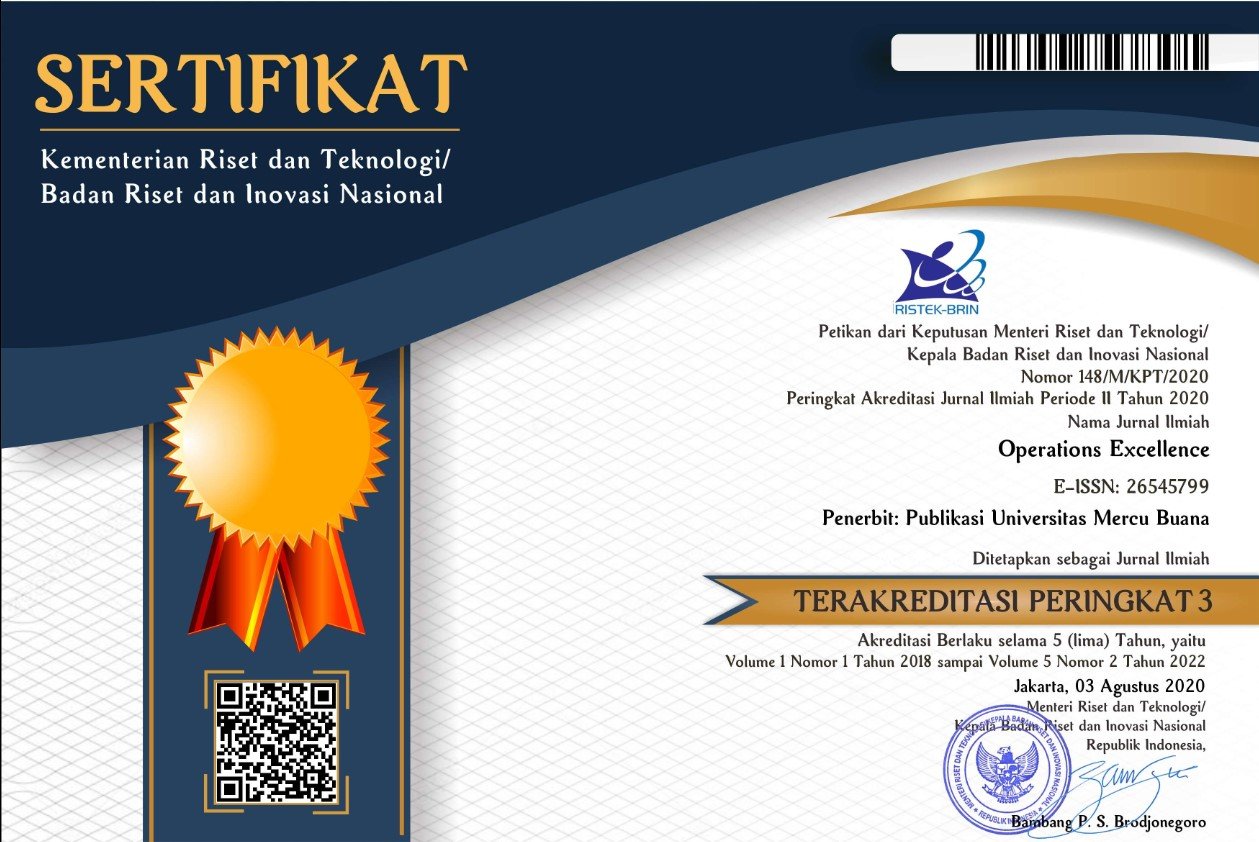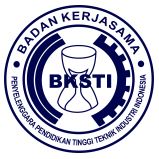Criteria for selecting third-party logistics service providers: Systematic Literature Review
Abstract
Keywords
Full Text:
PDFReferences
Afrasiabi, A., Tavana, M., & Di Caprio, D. (2022). An extended hybrid fuzzy multi-criteria decision model for sustainable and resilient supplier selection. Environmental Science and Pollution Research, 29(25), 37291–37314. https://doi.org/10.1007/s11356-021-17851-2
Aguezzoul, A. (2014). Third-party logistics selection problem: A literature review on criteria and methods. Omega, 49, 69–78. https://doi.org/10.1016/j.omega.2014.05.009
Ahi, P., & Searcy, C. (2013). A comparative literature analysis of definitions for green and sustainable supply chain management. Journal of Cleaner Production, 52, 329–341. https://doi.org/10.1016/j.jclepro.2013.02.018
Akram, M., Shumaiza, & Al-Kenani, A. N. (2020). Multi-criteria group decision-making for selection of green suppliers under bipolar fuzzy PROMETHEE process. Symmetry, 12(1), 1–25. https://doi.org/10.3390/SYM12010077
Angkiriwang, R., Pujawan, I. N., & Santosa, B. (2014). Managing uncertainty through supply chain flexibility: reactive vs. proactive approaches. Production & Manufacturing Research, 2(1), 50–70. https://doi.org/10.1080/21693277.2014.882804
Baidya, J., Garg, H., Saha, A., Mishra, A. R., Rani, P., & Dutta, D. (2021). Selection of third party reverses logistic providers: an approach of BCF-CRITIC-MULTIMOORA using Archimedean power aggregation operators. Complex and Intelligent Systems, 7(5), 2503–2530. https://doi.org/10.1007/s40747-021-00413-x
Behzadi, G., O’Sullivan, M. J., & Olsen, T. L. (2020). On metrics for supply chain resilience. European Journal of Operational Research, 287(1), 145–158. https://doi.org/10.1016/J.EJOR.2020.04.040
Chattopadhyay, R., Chakraborty, S., & Chakraborty, S. (2020). An integrated d-marcos method for supplier selection in an iron and steel industry. Decision Making: Applications in Management and Engineering, 3(2), 49–69. https://doi.org/10.31181/dmame2003049c
Chen, C. H. (2020). A novel multi-criteria decision-making model for building material supplier selection based on entropy-AHP weighted TOPSIS. Entropy, 22(2). https://doi.org/10.3390/e22020259
Christopher, M. (2023). Logistics & Supply Chain Management (6th ed.). Pearson Education Limited. http://library.lol/main/042DCCEE5DC519B03713E6DFC2CFADBA
Dang, T.-T., Nguyen, N.-A.-T., Nguyen, V.-T.-T., & Dang, L.-T.-H. (2022). A Two-Stage Multi-Criteria Supplier Selection Model for Sustainable Automotive Supply Chain under Uncertainty. Axioms, 11(5). https://doi.org/10.3390/axioms11050228
Ejem, E. A., Uka, C. M., Dike, D. N., Ikeogu, C. C., Igboanusi, C. C., & Chukwu, O. E. (2021). Evaluation and Selection of Nigerian Third-Party Logistics Service Providers Using Multi-Criteria Decision Models. LOGI - Scientific Journal on Transport and Logistics, 12(1), 135–146. https://doi.org/10.2478/logi-2021-0013
Fallahpour, A., Nayeri, S., Sheikhalishahi, M., Wong, K. Y., Tian, G., & Fathollahi-Fard, A. M. (2021). A hyper-hybrid fuzzy decision-making framework for the sustainable-resilient supplier selection problem: a case study of Malaysian Palm oil industry. Environmental Science and Pollution Research. https://doi.org/10.1007/s11356-021-12491-y
Fan, J., Guan, R., & Wu, M. (2020). Z-MABAC method for the selection of third-party logistics suppliers in fuzzy environment. IEEE Access, 8, 199111–199119. https://doi.org/10.1109/ACCESS.2020.3035025
Fatoni, A., & Hardianti, D. (2020). Pengaruh Fasilitas dan Kualitas Pelayanan terhadap Keputusan Menggunakan Jasa Transportasi MRT atau Mass Rapid Transit. Mediastima, 26(1), 117–134. https://doi.org/10.55122/mediastima.v26i1.99
Fatoni, A., Setyawan, I., & Pirmansyah, I. (2023). Dampak E-commerce terhadap Munculnya Kreativitas Berwirausaha dan Daya Saing Usaha Mikro Kecil Muslimah Majelis Taqorrub Ilallah (MTI) Bekasi. Jurnal Ilmiah Universitas Batanghari Jambi, 23(1), 145–150. https://doi.org/10.33087/jiubj.v23i1.3071
Fazlollahtabar, H., & Kazemitash, N. (2021). Green supplier selection based on the information system performance evaluation using the integrated best-worst method. Facta Universitatis, Series: Mechanical Engineering, 19(3), 345–360. https://doi.org/10.22190/FUME201125029F
Gao, H., Ran, L., Wei, G., Wei, C., & Wu, J. (2020). Vikor method for MAGDM based on Q-rung interval-years, given the advantages of considering the compromise between and its application to supplier selection of medical consumption products. International Journal of Environmental Research and Public Health, 17(2). https://doi.org/10.3390/ijerph17020525
Govindan, K., Mina, H., Esmaeili, A., & Gholami-Zanjani, S. M. (2020). An Integrated Hybrid Approach for Circular supplier selection and Closed loop Supply Chain Network Design under Uncertainty. Journal of Cleaner Production, 242, 1–16. https://doi.org/10.1016/j.jclepro.2019.118317
Granillo-Macías, R., & González-Hernández, I. J. (2021). Selection and evaluation of third party logistics in the supply chain: A systematic review. Cuadernos de Gestión, 21(2), 7–18. https://doi.org/10.5295/cdg.191141rg
Gultom, J. R., Setyawan, I., & Laksono, R. (2023). Peran kepercayaan dalam memediasi efek persepsi kemudahan dan persepsi nilai digital pada niat penggunaan kontinu e-payment. Mediastima, 29(1), 54–70. https://ejournal-ibik57.ac.id/index.php/mediastima/article/view/707
Handley, S. M., & Benton, W. C. (2013). The influence of task- and location-specific complexity on the control and coordination costs in global outsourcing relationships. Journal of Operations Management, 31(3), 109–128. https://doi.org/10.1016/J.JOM.2012.12.003
Haradongan, F., Widodo, S., Soepriyadi, I., Gugat, R. M. D., Fachrial, P., Liana, E., Suryobuwono, A. A., Perwitasari, E. P., & Yusuf, M. (2023). Optimization Of Road-Based Mass Transportationroad-Based Mass Transport Optimization. Journal of Namibian Studies : History Politics Culture, 34, 3735–3743.
Hidayad, M. K., & Utama, D. N. (2022). Third-Party Logistic Selection for Logistic Aggregator Company using Multi-Criteria Decision Making. Journal of Computer Science, 18(9), 811–820. https://doi.org/10.3844/jcssp.2022.811.820
Hoseini, S. A., Fallahpour, A., Wong, K. Y., Mahdiyar, A., Saberi, M., & Durdyev, S. (2021). Sustainable supplier selection in construction industry through hybrid fuzzy-based approaches. Sustainability , 13(3), 1–19. https://doi.org/10.3390/su13031413
Jain, N., & Singh, A. R. (2020). Sustainable supplier selection criteria classification for Indian iron and steel industry: a fuzzy modified Kano model approach. International Journal of Sustainable Engineering, 13(1), 17–32. https://doi.org/10.1080/19397038.2019.1566413
Jain, N., Singh, A. R., & Upadhyay, R. K. (2020). Sustainable supplier selection under attractive criteria through FIS and integrated fuzzy MCDM techniques. International Journal of Sustainable Engineering, 13(6), 441–462. https://doi.org/10.1080/19397038.2020.1737751
Javad, M. O. M., Darvishi, M., & Javad, A. O. M. (2020). Green supplier selection for the steel industry using BWM and fuzzy TOPSIS: A case study of Khouzestan steel company. Sustainable Futures, 2(Query date: 2023-12-23 13:34:10104 cites: https://www.scopus.com/inward/citedby.uri?partnerID=HzOxMe3b & scp=85084415702 & origin=inward). https://doi.org/10.1016/j.sftr.2020.100012
Jesson, J. K., Matheson, L., & Lacey, F. M. (2011). Doing Your Literature Review: Traditional and Systematic Techniques (1st ed.). SAGE Publications Ltd. https://library.lol/main/EC670A85E58A0C1D6248EF0FCE5D5352
Jovčić, S. (2021). A hybrid mcdm approach in third-party logistics (3pl) provider selection. Mathematics, 9(21). https://doi.org/10.3390/math9212729
Jung, H. (2017). Evaluation of Third Party Logistics Providers Considering Social Sustainability. Sustainability, 9(5), 2–18. https://doi.org/10.3390/su9050777
Kaya, S. K., & Aycin, E. (2021). An integrated interval type 2 fuzzy AHP and COPRAS-G methodologies for supplier selection in the era of Industry 4.0. Neural Computing and Applications, 33(16), 10515–10535. https://doi.org/10.1007/s00521-021-05809-x
Kotlars, A., & Skribans, V. (2023). Development and Practical Application of Hybrid Decision-Making Model for Selection of Third-Party Logistics Service Providers. Transport and Telecommunication, 24(4), 443–458. https://doi.org/10.2478/ttj-2023-0035
Kumar, P., & Singh, R. K. (2012). A fuzzy AHP and TOPSIS methodology to evaluate 3PL in a supply chain. Journal of Modelling in Management, 7(3), 287–303. https://doi.org/10.1108/17465661211283287
Kurniawati, D., Yuliando, H., & Widodo, K. H. (2013). Kriteria Pemilihan Pemasok Menggunakan Analytical Network Process. Jurnal Teknik Industri, 15(1), 25–32. https://doi.org/10.9744/jti.15.1.25-32
Liu, Y., Zhou, P., Li, L., & Zhu, F. (2020). An interactive decision-making method for third-party logistics provider selection under hybrid multi-criteria. Symmetry, 12(5). https://doi.org/10.3390/SYM12050729
Lu, J., Zhang, S., Wu, J., & Wei, Y. (2021). COPRAS Method for Multiple Attribute Group Decision Making Under Picture Fuzzy Environment and Their Application to Green Supplier Selection. Technological and Economic Development of Economy, 27(2), 369–385. https://doi.org/10.3846/tede.2021.14211
Luyen, L. A., & Thanh, N. Van. (2022). Logistics Service Provider Evaluation and Selection: Hybrid SERVQUAL–FAHP–TOPSIS Model. Processes, 10(5). https://doi.org/10.3390/pr10051024
Mahmoudi, A., Javed, S. A., & Mardani, A. (2022). Gresilient supplier selection through Fuzzy Ordinal Priority Approach: decision-making in post-COVID era. Operations Management Research, 15(1), 208–232. https://doi.org/10.1007/s12063-021-00178-z
Majid, S. A., Yundriana, R., Soepriyadi, I., Pahala, Y., Fachrial, P., Setiawan, A., Wardana, A., Soekirman, A., Nofrisel, ., Fahriza, B., Hikmawati, N. K., & Endri, E. (2022). Strategies for Improving Air Connectivity in Indonesia through the Indonesian, Malaysia and Thailand Growth Triangle Cooperation. Academic Journal of Interdisciplinary Studies, 11(5), 62–72. https://doi.org/10.36941/ajis-2022-0125
Marzouk, M., & Sabbah, M. (2021). AHP-TOPSIS social sustainability approach for selecting supplier in construction supply chain. Cleaner Environmental Systems, 2, 1–9. https://doi.org/10.1016/j.cesys.2021.100034
Masoomi, B., Sahebi, I. G., Fathi, M., Yıldırım, F., & Ghorbani, S. (2022). Strategic supplier selection for renewable energy supply chain under green capabilities (fuzzy BWM-WASPAS-COPRAS approach). Energy Strategy Reviews, 40, 1–17. https://doi.org/10.1016/j.esr.2022.100815
Mishra, A. R., Rani, P., & Pandey, K. (2022). Fermatean fuzzy CRITIC-EDAS approach for the selection of sustainable third-party reverse logistics providers using improved generalized score function. Journal of Ambient Intelligence and Humanized Computing, 13(1), 295–311. https://doi.org/10.1007/s12652-021-02902-w
Murphy, Jr. , P. R., & Knemeyer, A. M. (2018). Contemporary Logistics (12th ed.). Pearson Education Limited.
Naeem, M., Qiyas, M., & Abdullah, S. (2021). An Approach of Interval-Valued Picture Fuzzy Uncertain Linguistic Aggregation Operator and Their Application on Supplier Selection Decision-Making in Logistics Service Value Concretion. Mathematical Problems in Engineering, 2021. https://doi.org/10.1155/2021/8873230
Naseem, M. H. (2021). Selection of logistics service provider for the e-commerce companies in pakistan based on integrated gra-topsis approach. Axioms, 10(3). https://doi.org/10.3390/axioms10030208
Okwu, M. O., & Tartibu, L. K. (2020). Sustainable supplier selection in the retail industry: A TOPSIS- and ANFIS-based evaluating methodology. International Journal of Engineering Business Management, 12. https://doi.org/10.1177/1847979019899542
Ozcan, E., & Ahiskali, M. (2020). 3PL service provider selection with a goal programming model supported with multicriteria decision making approaches. Gazi University Journal of Science, 33(2), 413–427. https://doi.org/10.35378/gujs.552070
Page, M. J., McKenzie, J. E., Bossuyt, P. M., Boutron, I., Hoffmann, T. C., Mulrow, C. D., Shamseer, L., Tetzlaff, J. M., Akl, E. A., Brennan, S. E., Chou, R., Glanville, J., Grimshaw, J. M., Hróbjartsson, A., Lalu, M. M., Li, T., Loder, E. W., Mayo-Wilson, E., McDonald, S., … Moher, D. (2021). The PRISMA 2020 statement: an updated guideline for reporting systematic reviews. BMJ, 1–9. https://doi.org/10.1136/bmj.n71
Pamucar, D., Torkayesh, A. E., & Biswas, S. (2023). Supplier selection in healthcare supply chain management during the COVID-19 pandemic: a novel fuzzy rough decision-making approach. Annals of Operations Research, 328(1), 977–1019. https://doi.org/10.1007/s10479-022-04529-2
Peng, J., Tian, C., Zhang, W., Zhang, S., & Wang, J. (2020). An integrated multi-criteria decision-making framework for sustainable supplier selection under picture fuzzy environment. Technological and Economic Development of Economy, 26(3), 573–598. https://doi.org/10.3846/tede.2020.12110
Pınar, A., Rouyendegh, B. D., & Özdemir, Y. S. (2021). Q-rung orthopair fuzzy topsis method for green supplier selection problem. Sustainability (Switzerland), 13(2), 1–14. https://doi.org/10.3390/su13020985
Qu, G., Zhang, Z., Qu, W., & Xu, Z. (2020). Green Supplier Selection Based on Green Practices Evaluated Using Fuzzy Approaches of TOPSIS and ELECTRE with a Case Study in a Chinese Internet Company. International Journal of Environmental Research and Public Health, 17(9), 2–32. https://doi.org/10.3390/ijerph17093268
Rajesh, R., Ganesh, K., & Pugazhendhi, S. (2013). Drivers for logistics outsourcing and factor analysis for selection of 3PL provider. International Journal of Business Excellence, 6(1), 37–58. https://doi.org/10.1504/IJBEX.2013.050575
Ramakrishnan, K. R., & Chakraborty, S. (2020). A cloud topsis model for green supplier selection. Facta Universitatis, Series: Mechanical Engineering, 18(3), 375–397. https://doi.org/10.22190/FUME200307036R
Rani, P., Mishra, A. R., Krishankumar, R., Mardani, A., Cavallaro, F., Ravichandran, K. S., & Balasubramanian, K. (2020). Hesitant fuzzy SWARA-complex proportional assessment approach for sustainable supplier selection (HF-SWARA-COPRAS). Symmetry, 12(7). https://doi.org/10.3390/sym12071152
Rashidi, K., Noorizadeh, A., Kannan, D., & Cullinane, K. (2020). Applying the triple bottom line in sustainable supplier selection: A meta-review of the state-of-the-art. Journal of Cleaner Production, 269, 122001. https://doi.org/10.1016/j.jclepro.2020.122001
Resende, C. H. L., Geraldes, C. A. S., & Lima, F. R. (2021). Decision Models for Supplier Selection in Industry 4.0 Era: A Systematic Literature Review. Procedia Manufacturing, 55, 492–499. https://doi.org/10.1016/j.promfg.2021.10.067
Riaz, M., Farid, H. M. A., Aslam, M., Pamucar, D., & Bozani´c, D. (2021). Novel approach for third-party reverse logistic provider selection process under linear diophantine fuzzy prioritized aggregation operators. Symmetry, 13(7), 1–31. https://doi.org/10.3390/sym13071152
Rösner, T. (2023). Supplier selection and order allocation in purchasing and supply management: a systematic literature review. International Journal of Procurement Management, 16(1), 31. https://doi.org/10.1504/IJPM.2023.127884
Rostamzadeh, R. (2020). A fuzzy decision-making approach for evaluation and selection of third party reverse logistics provider using fuzzy aras. Transport, 35(6), 635–657. https://doi.org/10.3846/transport.2020.14226
Rostamzadeh, R., Esmaeili, A., Sivilevičius, H., & Nobard, H. B. K. (2021). A Fuzzy Decision-Making Approach for Evaluation and Selection of Third Party Reverse Logistics Provider Using FUZZY ARAS. Transport, 35(6), 635–657. https://doi.org/10.3846/transport.2020.14226
Rosyidi, C. N., Khasanah, A. M., & Laksono, P. W. (2022). Goal Programming Model for Joint Decision Making of Order Allocation, Supplier Selection, and Carrier Selection Considering Corporate Social Responsibility. Jurnal Teknik Industri, 24(1), 45–52. https://doi.org/10.9744/jti.24.1.45-52
Rusmana, A. W., & Setyawan, I. (2021). Pengaruh Integrasi Supply Chain terhadap Kinerja Supply Chain. Jurnal Bisnis, Logistik Dan Supply Chain (BLOGCHAIN), 1(2), 67–76. https://ejournal-ibik57.ac.id/index.php/blogchain/article/view/329
Salimian, S., Mousavi, S. M., & Antucheviciene, J. (2022). An Interval-Valued Intuitionistic Fuzzy Model Based on Extended VIKOR and MARCOS for Sustainable Supplier Selection in Organ Transplantation Networks for Healthcare Devices. Sustainability (Switzerland), 14(7). https://doi.org/10.3390/su14073795
Setyawan, I., Laksono, R., & Gultom, J. R. (2022). Kualitas Layanan Last-Mile Delivery: Studi Komparasi Dua Layanan Pesan-Antar Makanan. Jurnal Ilmiah Universitas Batanghari Jambi, 22(3), 2050–2060. https://doi.org/10.33087/jiubj.v22i3.2692
Shi, X., Deng, J., Su, X., & Cao, C. (2021). Third-party Payment Services Selection for Logistics Public Information Platforms. Journal of Physics: Conference Series, 1910(1), 1–10. https://doi.org/10.1088/1742-6596/1910/1/012036
Soepriyadi, I. (2021). Dukungan terhadap Pengembangan Industri Logistik Kargo atau Barang Udara. Mediastima, 27(2), 110–139. https://doi.org/10.55122/mediastima.v27i2.292
Song, J., Jiang, L., Liu, Z., Leng, X., & He, Z. (2022). Selection of Third-Party Reverse Logistics Service Provider Based on Intuitionistic Fuzzy Multi-Criteria Decision Making. Systems, 10(5), 1–27. https://doi.org/10.3390/systems10050188
Sople, V. V. (2017). Logistics Management: The Supply Chain Imperative (3rd ed.). Pearson India Education Services Pvt. Ltd. http://library.lol/main/49721681A1982618DBF1F3B89A85B080
Sumrit, D. (2020). Supplier selection for vendor-managed inventory in healthcare using fuzzy multi-criteria decision-making approach. Decision Science Letters, 9(2), 233–256. https://doi.org/10.5267/j.dsl.2019.10.002
Tavana, M., Yazdani, M., & Di Caprio, D. (2017). An application of an integrated ANP–QFD framework for sustainable supplier selection. International Journal of Logistics Research and Applications, 20(3), 254–275. https://doi.org/10.1080/13675567.2016.1219702
Tirkolaee, E. B., Dashtian, Z., Weber, G.-W., Tomaskova, H., Soltani, M., Mousavi, & Nasim Sadat. (2021). An integrated decision-making approach for green supplier selection in an agri-food supply chain: Threshold of robustness worthiness. Mathematics, 9(11), 1–30. https://doi.org/10.3390/math9111304
Tsai, M.-C., Lai, K., Lloyd, A. E., & Lin, H.-J. (2012). The dark side of logistics outsourcing – Unraveling the potential risks leading to failed relationships. Transportation Research Part E: Logistics and Transportation Review, 48(1), 178–189. https://doi.org/10.1016/j.tre.2011.07.003
Tuljak-Suban, D., & Bajec, P. (2020). Integration of AHP and GTMA to make a reliable decision in complex decision-making problems: Application of the logistics provider selection problem as a case study. Symmetry, 12(5). https://doi.org/10.3390/SYM12050766
Ulutaş, A. (2021). A grey hybrid model to select the optimal third-party logistics provider. South African Journal of Industrial Engineering, 32(1), 171–181. https://doi.org/10.7166/32-1-2126
Wang, C.-N., Dang, T.-T., & Nguyen, N.-A.-T. (2021). Outsourcing reverse logistics for e-commerce retailers: A two-stage fuzzy optimization approach. Axioms, 10(1), 1–22. https://doi.org/10.3390/axioms10010034
Wang, C.-N., Hsiung-Tien Tsai, Thanh-Phong Ho, Thanh-Phong Ho, & Ying-Fang Huang. (2020). Multi-criteria decision making (MCDM) model for supplier evaluation and selection for oil production projects in vietnam. Processes, 8(2). https://doi.org/10.3390/pr8020134
Wang, C.-N., Nguyen, N.-A.-T., Dang, T.-T., & Lu, C.-M. (2021). A compromised decision-making approach to third-party logistics selection in sustainable supply chain using fuzzy ahp and fuzzy vikor methods. Mathematics, 9(8). https://doi.org/10.3390/math9080886
Wei, C., Wu, J., Guo, Y., & Wei, G. (2021). Green supplier selection based on codas method in probabilistic uncertain linguistic environment. Technological and Economic Development of Economy, 27(3), 530–549. https://doi.org/10.3846/tede.2021.14078
Wiangkam, N., Jamrus, T., & Sureeyatanapas, P. (2022). The decision-making for selecting cold chain logistics providers in the food industry. Engineering and Applied Science Research, 49(6), 811–818. https://doi.org/10.14456/easr.2022.79
Yazdani, M., Ebadi Torkayesh, A., Stević, Ž., Chatterjee, P., Asgharieh Ahari, S., & Doval Hernandez, V. (2021). An interval valued neutrosophic decision-making structure for sustainable supplier selection. Expert Systems with Applications, 183, 115354. https://doi.org/10.1016/j.eswa.2021.115354
Yazdani, M., Pamucar, D., Chatterjee, P., & Torkayesh, A. E. (2022). “A multi-tier sustainable food supplier selection model under uncertainty.” Operations Management Research, 15(1), 116–145. https://doi.org/10.1007/s12063-021-00186-z
Zhang, D., Su, Y., Zhao, M., & Chen, X. (2021). CPT-TODIM Method for Interval Neutrosophic MAGDM and Its Application to Third-Party Logistics Service Providers Selection. Technological and Economic Development of Economy, 28(1), 201–219. https://doi.org/10.3846/tede.2021.15758
Zhang, X., & Su, T. (2020). The Dominance Degree-Based Heterogeneous Linguistic Decision-Making Technique for Sustainable 3PRLP Selection. Complexity, 2020, 1–18. https://doi.org/10.1155/2020/6102036
DOI: http://dx.doi.org/10.22441/oe.2024.v16.i2.112
Refbacks
- There are currently no refbacks.
Copyright (c) 2024 Operations Excellence: Journal of Applied Industrial Engineering

This work is licensed under a Creative Commons Attribution-ShareAlike 4.0 International License.
Journal ISSN:
| Print ISSN: 2085-4293 | |
| Online ISSN: 2654-5799 |
Tim Editorial Office
Operations Excellence: Journal of Applied Industrial Engineering
Magister Teknik Industri Universitas Mercu Buana
Jl. Raya Meruya Selatan No. 1 Kembangan Jakarta Barat
Email: [[email protected]]
Website: http://publikasi.mercubuana.ac.id/index.php/oe
Journal DOI: 10.22441/oe
The Journal is Indexed and Journal List Title by:

.png)
.png)
.png)


Operations Excellence: Journal of Applied Industrial Engineering is licensed under a Creative Commons Attribution-NonCommercial-ShareAlike 4.0 International License.










